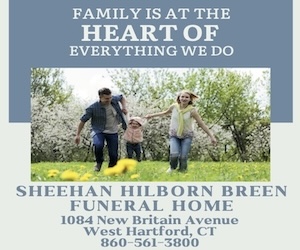New Hartford program teaches caregivers the basics and more
By Cindy Mindell
WEST HARTFORD – By now, it is common knowledge that many older adults still living at home are cared for by family members. It is common wisdom that those caregivers must also take care of themselves in order to avoid burnout.
But how do family members learn to be effective caregivers?
Over the course of her 10 years as director of Life Enrichment and Dementia Care at Hebrew Health Care in West Hartford, Pamela Atwood has heard the question many times. Five years ago, she began to formulate an answer.
“I was getting calls from caregivers, mostly women, who seemed to lack basic information, not just for dementia care, but for older adults in general,” she says. “I identified a gap in information not generally available in the community, a way for caregivers to gain access to expertise while looking for home-care or assisted-living options.”
Last month, Atwood and Hebrew Health Care launched Aging Care Academy, a program that offers family members caring for older adults information, resources, and support via 90-minute classes. The curriculum includes both core courses – those subjects that all caregivers should become familiar with – and electives, which address specific diseases and individual caregiving situations. Each class is offered in both an afternoon and evening time-slot. Atwood says that the curriculum is flexible enough to change according to participants’ needs.
“Search today and you’ll find a lot of caregiver-type courses within certain disciplines or diseases,” she says. “For example, the Alzheimer’s Association gives a great one but if you’re not dealing with Alzheimer’s or dementia, it has no value to you. Our program is designed to bring together all aspects of gericentric care, under the Hebrew Health Care brand, where the older adult is at the center of all our services.”
Atwood is a certified dementia practitioner who earned a degree in gerontology from University of Saint Joseph in West Hartford. She teaches some of the courses, along with fellow Hebrew Health Care staff-members, including social workers, nurses, and other dementia practitioners. Experts are brought in from the greater community to teach topics like legal and financial issues pertaining to older adults. “Knowledge is power,” Atwood says. “We can take the crisis out of the many changes in eldercare laws and logistics by being prepared with information.”
An advisory council of caregivers and other family members, healthcare professionals, and Hebrew Health Care board members and corporators designs the curriculum and outcome measures.
The group is chaired by Phyllis Gelles of Bloomfield, caregiver to her husband, Gerald, who has dementia. “This kind of care generally falls to one person,” she says. “Unless you’ve learned about the kinds of issues the Academy presents, you get lost in a maze and don’t know where to turn. You need somebody who knows the ins and outs of the system to teach you how to cope with what is going on with the person you are caring for.”
Aging Care Academy received a $10,000 seed grant from the Farmington Bank Community Foundation, which supports projects in three areas: economic empowerment, investment in the community via cultural institutions, and health and wellness.
“We were discussing the big issues coming up in the community,” says Christine Traczyk, executive director of the foundation. “Connecticut in particular has an aging population, many more Baby Boomers than other states, and we seem to be losing our 24- to 35-year-olds. There is a lot more emphasis on people having to become caretakers for their parents, and many of our employees are in that situation – trying to work full-time and address family issues. Healthcare is a huge issue and Hebrew Health Care is one step ahead, trying to think about this in a positive way and be proactive about it. Aging Care Academy is a program that addresses an up-and-coming issue that many people in the community are dealing with. We wanted to help launch a program that provides support services and helps families determine best the medical care for an aging family member.”
The inaugural semester will conclude in November with another scheduled to start in early 2013. Participants can register any time during the semester and take a single course or more than one. Tuition is $20 per course; scholarships are available.
Comments? Email cindym@jewishledger.com.








 Southern New England Jewish Ledger
Southern New England Jewish Ledger








